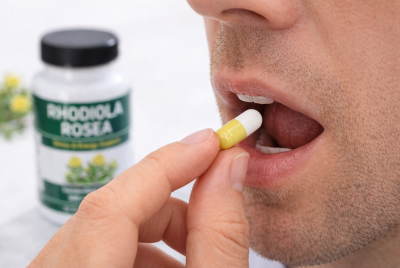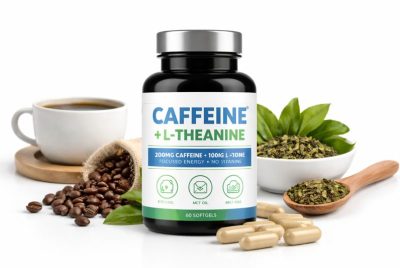7 Brain Fog Supplements You Need for Focus & Clarity
We may earn a commission for purchases made using our links. Please see our disclosure for more details.
Ever have days when your brain feels foggy? Words slip away, focus fades, and even simple tasks feel hard. You’re not imagining it—brain fog is real. It’s not a disease, but a sign your body and mind need support. Stress, poor sleep, low nutrients, or too little sunlight can all play a part. The good news is you can clear the haze. With the right brain fog supplements and a few healthy habits, you can boost focus, energy, and mental clarity so your mind feels sharp again.
Brain Fog Explained: Why It Happens
What is Brain Fog?
“Brain fog” is a catch-all term describing cognitive sluggishness—difficulty concentrating, recalling things, feeling mentally “off”. While not a formal diagnosis, it reflects real symptoms that may stem from multiple causes. For instance, one review shows that nutrient deficiencies like low vitamin D, B-12, iron or omega-3 fatty acids may contribute.
Why It Matters
When your brain is in fog mode, you’re less efficient, more error-prone and your mood may suffer. Over time, persistent brain fog can impact work, relationships and quality of life. So instead of brushing it off, it’s worth exploring underlying causes and potential support strategies.
Root Causes to Consider
Here are some common contributing factors:
- Nutrient gaps: Low levels of B-vitamins, magnesium, vitamin D or omega-3s can reduce cognitive speed and clarity.
- Lifestyle stressors: Poor sleep, high stress, sedentary habits and sugar-heavy diets can all degrade clarity.
- Hormonal/medical issues: Hormonal shifts (e.g., menopause), thyroid problems, chronic illness or post-viral states may present as fog.
- Over-reliance on supplements alone: It’s important to know that while supplements can help fill gaps, they aren’t magic. Some high-quality trials show limited benefit when used in isolation.
With that context in mind, let’s review the best-supported supplements to consider.

The 7 Brain Fog Supplements That Can Support Focus & Clarity
Below are seven brain fog supplements that have shown promise—each with evidence, suggested purpose, and caveats.
1. B-Complex Vitamins
B-vitamins are the brain’s spark plugs—they keep your cells energized, your nerves functioning smoothly, and your mind alert. Deficiencies in B-vitamins, particularly B12 and folate, have been linked to fatigue, forgetfulness, and even mild cognitive decline. To get the most from your supplement, choose a balanced B-complex that includes B1, B2, B3, B5, B6, B9 (folate), and B12. While research on brain fog itself is limited, studies show that restoring low B-vitamin levels can significantly improve energy and mental clarity in deficient individuals. For best absorption, take your B-complex with food, and if you’re vegetarian, vegan, or over 50, pay special attention to your B12 intake since deficiency is more common in these groups.
2. Vitamin D
Known as the “sunshine vitamin,” vitamin D plays a quiet but powerful role in mental sharpness and mood stability. Low levels are surprisingly widespread and have been associated with fatigue, poor focus, and irritability. A small study in post-menopausal women found that a daily dose of 2,000 IU improved learning and memory compared to lower doses, hinting at vitamin D’s cognitive potential. Ideally, have your blood levels tested before supplementing, and combine your intake with sunlight exposure when possible. Many experts also recommend pairing it with vitamin K2 to support proper absorption and calcium balance.
3. Omega-3 Fatty Acids (EPA & DHA)
Omega-3 fatty acids are essential building blocks for brain health. These healthy fats—especially EPA and DHA—form cell membranes and help brain cells communicate effectively. A number of reviews highlight improvements in memory and attention after consistent fish-oil use. If you don’t eat oily fish several times a week, a supplement may help fill the gap. Choose a high-quality, third-party-tested fish oil or algal oil (for vegetarians) with an optimal balance of EPA and DHA. To preserve potency, store it in a cool, dark place and always check the expiration date to avoid oxidation.
4. Magnesium
Magnesium is nature’s relaxant—it regulates nerve transmission, helps manage stress, and supports the chemical messengers that keep your mind calm and focused. When levels run low, brain fog, irritability, and restlessness can set in. According to Healthline, maintaining adequate magnesium is crucial for cognitive function and overall mental wellness. For brain benefits, look for bioavailable forms such as magnesium glycinate or L-threonate, which cross the blood-brain barrier more effectively. Follow the dosage on your supplement label, and if you have kidney issues, check with your healthcare provider before adding magnesium to your routine.
5. Vitamin C
Often praised for immune defense, vitamin C is also vital for the brain. It supports neurotransmitter production, protects neurons from oxidative stress, and helps maintain attention and memory. Research shows that people with higher vitamin C levels tend to perform better on cognitive tests. You can get plenty from foods like citrus, berries, and bell peppers, but supplementation may help if you smoke, have high stress, or rely on processed foods. Consistent intake keeps your mind alert and your thinking sharp throughout the day.
6. L-Theanine
L-theanine is the calm-focus molecule found naturally in green and black tea. It promotes a relaxed yet alert state, balancing alpha brain waves without the crash associated with caffeine. Studies reviewed by Verywell Health highlight its ability to improve reaction time and focus, especially when paired with moderate caffeine. For best results, try 100 to 200 mg in the morning or early afternoon to smooth out mental tension and sustain concentration during demanding work sessions. Always choose pure L-theanine from reputable brands to ensure consistency and safety.
7. Lion’s Mane Mushroom
Lion’s Mane is a fascinating natural nootropic gaining attention for its potential to boost clarity and memory. This shaggy mushroom stimulates the production of nerve growth factor (NGF), which supports neuron repair and communication. A 16-week study published in PMC found improved cognitive performance in participants with mild impairment who took Lion’s Mane extract. To get the most benefit, look for supplements made from the fruiting body rather than the mycelium, and verify third-party purity testing. Though research is still emerging, early evidence points to Lion’s Mane as a promising aid for mental clarity, especially when combined with a balanced lifestyle.
How to Use Brain Fog Supplements Effectively (and Safely)
Step 1 – Address the Lifestyle Bedrock
Supplements work best when layered on a healthy foundation:
- Sleep 7-9 hours and maintain consistent schedule
- Stay physically active (30-min moderate exercise most days)
- Eat a nutrient-dense diet: vegetables, lean protein, whole-grains, oily fish, nuts/seeds
- Hydrate well (aim for ~2-3 L water/day depending on size/activity)
- Manage stress (mindfulness, breaks, nature)
Step 2 – Identify Potential Gaps
Test or evaluate your diet and health status. For example: low B12, low vitamin D, insufficient fish intake, or high stress. As the review notes, “A deficiency in several nutrients could potentially contribute to brain fog.”
Step 3 – Introduce Supplements Sensibly
- Choose one or two supplements rather than starting all at once.
- Pick quality brands with third-party testing.
- Use for ~6-8 weeks and monitor how you feel (focus, clarity, memory).
- Consult your healthcare provider if you’re on medications, pregnant, have kidney/liver issues.
- Keep expectations realistic: even the best studies show modest benefits. As one reference states, “Evidence from high-quality trials does not support…” broad claims.
Step 4 – Integrate Into a Program
Consider combining supplement use with a structured reset program to synchronize your lifestyle reboot with nutritional support. That can amplify effect and create sustainable clarity.
What the Science Really Says (and Doesn’t)
It’s important to separate what’s scientifically grounded from what’s simply marketed as “brain boosting.” While supplements can play a valuable role when there’s a deficiency, the current evidence emphasizes that brain fog is often multifactorial—rooted in lifestyle, nutrition, and underlying health conditions rather than a single nutrient shortfall.
According to Bangkok Hospital, brain fog is not a disease but a symptom that may arise from several physiological and environmental factors such as hormonal imbalance, chronic stress, sleep deprivation, and nutritional deficiencies. The hospital explains that when the brain lacks essential nutrients—like B-vitamins, omega-3 fatty acids, or magnesium—its ability to process information and maintain concentration can decline. Their medical overview highlights that brain fog improvement requires a holistic approach: balancing diet, managing stress, and ensuring proper sleep alongside any supplementation.

Similarly, Lone Star Neurology notes that vitamin D deficiency plays a critical role in how the brain feels and functions. The study points out that low vitamin D levels are linked to decreased neurotransmitter activity and slower cognitive processing, contributing to symptoms of mental fatigue and reduced clarity. It further emphasizes the importance of regular sunlight exposure or supplementation—especially for individuals who spend most of their time indoors—to maintain optimal brain performance.
In short:
- If you are deficient, correcting that imbalance—particularly vitamin D, B-vitamins, or magnesium—can restore sharper focus and cognitive energy.
- If your nutrition is already adequate, supplements may have only a modest effect unless paired with other healthy habits like movement, hydration, and adequate rest.
- Supplements are supports, not substitutes—they work best when combined with a nutrient-rich diet, sunlight exposure, and stress management techniques.
These studies remind us that addressing brain fog requires balance: nourish your body, move your mind, and rest your brain as much as you supplement it.
Conclusion
If you’ve been dealing with brain fog and want sharper focus, the best approach is twofold: first, get your basics right—sleep, nutrition, hydration, movement, and stress management. Then, use supplements strategically to fill any real gaps. The seven brain fog supplements we covered form a solid foundation for most people. Just remember, supplements are tools, not quick fixes. Choose reputable brands, talk to your healthcare provider, and track how you feel over time. With a little consistency, you’ll likely notice your thoughts getting clearer, your memory sharper, and your energy more stable.
Frequently Asked Questions
Q1: What is the best supplement for brain fog?
There’s no single best pill that works for everyone. However, starting with a B-complex (especially B12/folate) plus omega-3 fatty acids tends to offer the most foundational support. From there, you can layer vitamin D, magnesium, vitamin C, L-theanine or Lion’s Mane based on your individual needs.
Q2: What’s the quickest way to get rid of brain fog?
The fastest approach is to address the low-hanging fruit: improve sleep, reduce stress, hydrate, eat a nutrient-rich diet and move your body. Then supplement strategically if you suspect nutrient gaps. Though there’s no “overnight cure,” combining these steps can lead to noticeable clarity within weeks.
Q3: Which vitamin deficiencies leads to mental haze?
Deficiencies in vitamin D, B12/folate, omega-3 fatty acids, magnesium, and vitamin C are strongly implicated in cognitive sluggishness and fog.
Q4: What hormone helps brain fog?
Hormones such as thyroid hormones (in hypothyroidism) and sex hormones (e.g., estrogen drops in menopause) can influence cognition and clarity. When you suspect hormonal shifts, it’s best to check with a healthcare provider.
Q5: What is the biggest cause of brain fog?
It’s hard to pick a single biggest cause because brain fog usually has multiple contributors. But if I had to, I’d say lifestyle stress (poor sleep, diet, inactivity, high stress) is the most common underlying driver in everyday cases. That said, persistent fog should prompt evaluation of nutrient, hormonal or medical causes.




